|
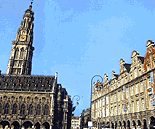
The Hôtel de Ville in the Place
des Héros
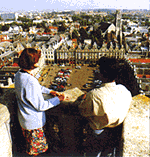
The view from the top of the belfry, looking over the Place
des Héros (Grand' Place is just to the left) and the
historic town
|
Two enormous cobbled
squares
You are standing in the vast cobbled market square in
the centre of Arras, admiring the historic Town Hall, and
the 17th and 18th century Flemish houses all around. The
square is lined with stone-pillared arcades, built to
shelter the merchants' customers while they looked at the
displays of goods. All the houses are of similar style -
reflecting the strict town planning controls of the town
council in those days.
There are two of these squares - Grand'Place,
which is mainly houses and a few good bars and restaurants;
and the smaller Place des Héros - which is
livelier with cafes and shops, the Town Hall
[Hôtel de Ville], and Tourist Office.
The two squares spring to life in the weekly market on
Saturday mornings.
Climb up the
Belfry
You can climb to the viewing platform high up the
belfry of the Town Hall - and look over the two squares and
the historic town.
Tunnels
Underneath the square runs a labyrinth of tunnels
carved into the chalk rock. Here the inhabitants of Arras
used to store wine and food - and seek refuge in times of
war.
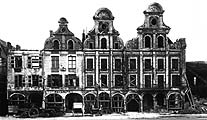 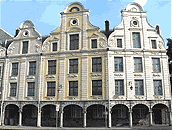
Restoring the Grand' Place in the 1920's after war-damage by
German shelling
|
|
First World
War
Arras was at the centre of much of the fighting in
World War I. It
narrowly missed being captured by the Germans in the initial
rush of their invasion in autumn 1914. Right behind the
Front Line, the town's civilian population was evacuated,
and its defending troops lived in tunnels under constant
bombardment by enemy shelling.
After the war, the whole town lay in ruins. In the
'twenties, the Town Hall and the old houses round the
squares were lovingly rebuilt - following the old design as
much as possible.
|
 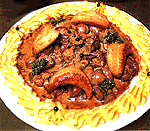
1.
Back at ground level, relax under the arcades in a
pavement cafe
2.
Try the town's speciality - small sausages, called
"andouillettes"
|
|
Museum & art
Gallery
The town's Museum & art gallery - the
Musée des Beaux-Arts - is in a fine 18th century
monastery which was built as part of the medieval Abbey of
St-Vaast.
It became an art gallery after the Revolution, but it is
still joined to the cathedral next door.
|

|
|
Regional capital through
the ages
Arras was the regional capital of the Gauls (the
Atrebates tribe), then the Romans.
In the Middle Ages, the town that grew up around the Abbey
of St. Vaast became famous as a textile
town - its best-known products were fine embroidered
wall-hangings, interwoven with gold and silver threads.
Because of this valuable content, few of these hangings have
survived.
Tapestry wall
hangings
During most of the Hundred
Years' War Arras and Flanders
were ruled by the Dukes of Burgundy. Arras tapestries were
fashionable in the lavish Burgundian court, and became
coveted throughout Europe in the castles of the wealthy from
about 1350 to 1460 . In Shakespeare's "Hamlet", characters
"hid behind the arras" to overhear secrets.
Troubadors and poets flourished under the patronage of the
city's rich bankers and merchants; the rich town with its
important cathedral and monastery were well-fortified.
|
|
This golden period ended with changing fashions, not
helped by French king Louis XI imposing harsh punishments on
the city's leading families in 1477 when he briefly
recaptured the town.
|
|
Agricultural market
town
|
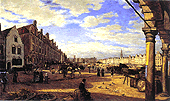 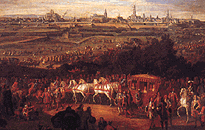
1.
Under Spanish rule, the
squares that had hosted cloth fairs now saw famers markets:
Arras' merchants grew rich out of trading in Artois grain. -
a 19th century painting of "Grand'Place on Market Day"
2.
Louis XIV made Arras part
of France - his triumphal entry into Arras
1667
|
|
Market town for rich
farming region
Spanish rule in
Flanders brought new and lasting prosperity to Arras as a
grain market for the rich cereal farms of the Artois and its
rolling chalk hills.
Arras did well. and was reluctant to return to French
rule when Louis
XIV besieged and captured it in 1640. He placed the
senior law courts - the parlement - for the Artois
region in Arras, and had his military engineer Vauban
strengthen its defences. The city fathers continued to
favour the Flemish style of architecture, in merchants'
houses built around the two squares in the 17th and 18th
centuries.
|
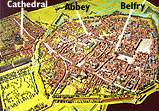
Arras in 1716: model showing the walls
and moats, built by the Spanish and strengthened after
capture by the French.
|
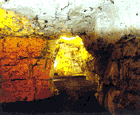 
1.
Miles of twisting tunnels
["boves" ] have been dug in the limestone
under the town squares over the centuries
2.
Start your visit to the
town with an audio-visual show in the Hôtel de
Ville
|
|
Web
links & more information
Arras
- town
guide, official Town hall site
Tourist information:
Hôtel de Ville, Place des Héros, 62000
ARRAS
Tél: 00 33 3 21 51 26 95
Fax: 00 33 3 21 71 07 34
|
Local area map:
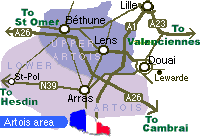
Click on places
for more information
|
|
Places
to visit:
|
Why not
try this  feature? feature?

QUICK
TOUR
round the Artois region, starting with
Vimy
Ridge...
|
Fine
Arts Museum
- Arras; prestigious collection
Salle
des Mays -
gallery in the Museum of 17th century religious art from
Notre-Dame in Paris
Notre-Dame
de Lorette & la
Targette -
memorials and museums about French sacrifices defending the
line in 1915.
Vimy
Ridge -
First World War memorials
Robespierre's
house -
infamous leader of the French Revolution and the
"Terror"
|
|
Background
Information:
Artois
- ancien regime
province of which Arras was the capital
Medieval
cloth trade
French
Revolution
First
World War
|
www.theotherside.co.uk Last updated 22nd April 2002; 19th
February 2001 © Copyright Invicta
Media 1999-2002
![]()















![]() feature?
feature?